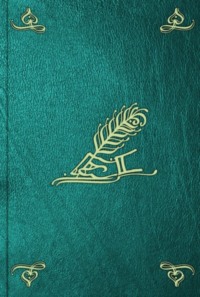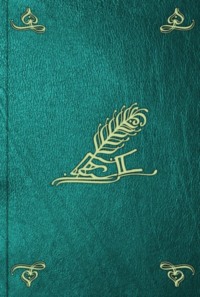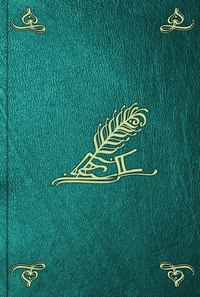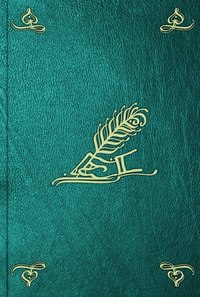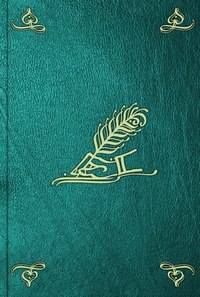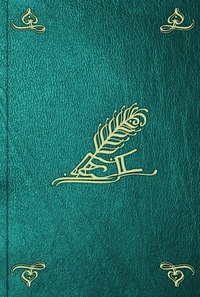 полная версия
полная версияCharles Darwin: His Life Told in an Autobiographical Chapter, and in a Selected Series of His Published Letters
Our long silence occurred to me a few weeks since, and I had then thought of writing, but was idle. I congratulate and condole with you on your tenth child; but please to observe when I have a tenth, send only condolences to me. We have now seven children, all well, thank God, as well as their mother; of these seven, five are boys; and my father used to say that it was certain that a boy gave as much trouble as three girls; so that bonâ fide we have seventeen children. It makes me sick whenever I think of professions; all seem hopelessly bad, and as yet I cannot see a ray of light. I should very much like to talk over this (by the way, my three bugbears are Californian and Australian gold, beggaring me by making my money on mortgage worth nothing; the French coming by the Westerham and Sevenoaks roads, and therefore enclosing Down; and thirdly, professions for my boys), and I should like to talk about education, on which you ask me what we are doing. No one can more truly despise the old stereotyped stupid classical education than I do; but yet I have not had courage to break through the trammels. After many doubts we have just sent our eldest boy to Rugby, where for his age he has been very well placed… I honour, admire, and envy you for educating your boys at home. What on earth shall you do with your boys? Very many thanks for your most kind and large invitation to Delamere, but I fear we can hardly compass it. I dread going anywhere, on account of my stomach so easily failing under any excitement. I rarely even now go to London, not that I am at all worse, perhaps rather better, and lead a very comfortable life with my three hours of daily work, but it is the life of a hermit. My nights are always bad, and that stops my becoming vigorous. You ask about water-cure. I take at intervals of two or three months, five or six weeks of moderately severe treatment, and always with good effect. Do you come here, I pray and beg whenever you can find time; you cannot tell how much pleasure it would give me and E. What pleasant times we had in drinking coffee in your rooms at Christ's College, and think of the glories of Crux-major.118 Ah, in those days there were no professions for sons, no ill-health to fear for them, no Californian gold, no French invasions. How paramount the future is to the present when one is surrounded by children. My dread is hereditary ill-health. Even death is better for them.
My dear Fox, your sincere friend.P.S. – Susan119 has lately been working in a way which I think truly heroic about the scandalous violation of the Act against children climbing chimneys. We have set up a little Society in Shrewsbury to prosecute those who break the law. It is all Susan's doing. She has had very nice letters from Lord Shaftesbury and the Duke of Sutherland, but the brutal Shropshire squires are as hard as stones to move. The Act out of London seems most commonly violated. It makes one shudder to fancy one of one's own children at seven years old being forced up a chimney – to say nothing of the consequent loathsome disease and ulcerated limbs, and utter moral degradation. If you think strongly on this subject, do make some enquiries; add to your many good works, this other one, and try to stir up the magistrates…
The following letter refers to the Royal Medal, which was awarded to him in November, 1853:
C. D. to J. D. Hooker. Down [November 1853]My dear Hooker – Amongst my letters received this morning, I opened first one from Colonel Sabine; the contents certainly surprised me very much, but, though the letter was a very kind one, somehow, I cared very little indeed for the announcement it contained. I then opened yours, and such is the effect of warmth, friendship, and kindness from one that is loved, that the very same fact, told as you told it, made me glow with pleasure till my very heart throbbed. Believe me, I shall not soon forget the pleasure of your letter. Such hearty, affectionate sympathy is worth more than all the medals that ever were or will be coined. Again, my dear Hooker, I thank you. I hope Lindley120 will never hear that he was a competitor against me; for really it is almost ridiculous (of course you would never repeat that I said this, for it would be thought by others, though not, I believe by you, to be affectation) his not having the medal long before me; I must feel sure that you did quite right to propose him; and what a good, dear, kind fellow you are, nevertheless, to rejoice in this honour being bestowed on me.
What pleasure I have felt on the occasion, I owe almost entirely to you.121
Farewell, my dear Hooker, yours affectionatelyThe following series of extracts, must, for want of space, serve as a sketch of his feeling with regard to his seven years' work at Barnacles122: —
September 1849.– "It makes me groan to think that probably I shall never again have the exquisite pleasure of making out some new district, of evolving geological light out of some troubled dark region. So I must make the best of my Cirripedia…"
October 1849.– "I have of late been at work at mere species describing, which is much more difficult than I expected, and has much the same sort of interest as a puzzle has; but I confess I often feel wearied with the work, and cannot help sometimes asking myself what is the good of spending a week or fortnight in ascertaining that certain just perceptible differences blend together and constitute varieties and not species. As long as I am on anatomy I never feel myself in that disgusting, horrid, cui bono, inquiring, humour. What miserable work, again, it is searching for priority of names. I have just finished two species, which possess seven generic, and twenty-four specific names! My chief comfort is, that the work must be sometime done, and I may as well do it, as any one else."
October 1852.– "I am at work at the second volume of the Cirripedia, of which creatures I am wonderfully tired. I hate a Barnacle as no man ever did before, not even a sailor in a slow-sailing ship. My first volume is out; the only part worth looking at is on the sexes of Ibla and Scalpellum. I hope by next summer to have done with my tedious work."
July 1853.– "I am extremely glad to hear that you approved of my cirripedial volume. I have spent an almost ridiculous amount of labour on the subject, and certainly would never have undertaken it had I foreseen what a job it was."
In September, 1854, his Cirripede work was practically finished, and he wrote to Sir J. Hooker:
"I have been frittering away my time for the last several weeks in a wearisome manner, partly idleness, and odds and ends, find sending ten thousand Barnacles123 out of the house all over the world. But I shall now in a day or two begin to look over my old notes on species. What a deal I shall have to discuss with you; I shall have to look sharp that I do not 'progress' into one of the greatest bores in life, to the few like you with lots of knowledge."
CHAPTER IX.
THE FOUNDATIONS OF THE 'ORIGIN OF SPECIES.'
To give an account of the development of the chief work of my father's life – the Origin of Species, it will be necessary to return to an earlier date, and to weave into the story letters and other material, purposely omitted from the chapters dealing with the voyage and with his life at Down.
To be able to estimate the greatness of the work, we must know something of the state of knowledge on the species question at the time when the germs of the Darwinian theory were forming in my father's mind.
For the brief sketch which I can here insert, I am largely indebted to vol. ii. chapter v. of the Life and Letters– a discussion on the Reception of the Origin of Species which Mr. Huxley "was good enough to write for me, also to the masterly obituary essay on my father, which the same writer contributed to the Proceedings of the Royal Society."124
Mr. Huxley has well said125:
"To any one who studies the signs of the times, the emergence of the philosophy of Evolution, in the attitude of claimant to the throne of the world of thought, from the limbo of hated and, as many hoped, forgotten things, is the most portentous event of the nineteenth century."
In the autobiographical chapter, my father has given an account of his share in this great work: the present chapter does little more than expand that story.
Two questions naturally occur to one: (1) – When and how did Darwin become convinced that species are mutable? How (that is to say) did he begin to believe in evolution. And (2) – When and how did he conceive the manner in which species are modified; when did he begin to believe in Natural Selection?
The first question is the more difficult of the two to answer. He has said in the Autobiography (p. 39) that certain facts observed by him in South America seemed to be explicable only on the "supposition that species gradually become modified." He goes on to say that the subject "haunted him"; and I think it is especially worthy of note that this "haunting," – this unsatisfied dwelling on the subject was connected with the desire to explain how species can be modified. It was characteristic of him to feel, as he did, that it was "almost useless" to endeavour to prove the general truth of evolution, unless the cause of change could be discovered. I think that throughout his life the questions 1 and 2 were intimately, – perhaps unduly so, connected in his mind. It will be shown, however, that after the publication of the Origin, when his views were being weighed in the balance of scientific opinion, it was to the acceptance of Evolution not of Natural Selection that he attached importance.
An interesting letter (Feb. 24, 1877) to Dr. Otto Zacharias,126 gives the same impression as the Autobiography: —
"When I was on board the Beagle I believed in the permanence of species, but as far as I can remember, vague doubts occasionally flitted across my mind. On my return home in the autumn of 1836, I immediately began to prepare my Journal for publication, and then saw how many facts indicated the common descent of species, so that in July, 1837, I opened a note-book to record any facts which might bear on the question. But I did not become convinced that species were mutable until, I think, two or three years had elapsed."
Two years bring us to 1839, at which date the idea of natural selection had already occurred to him – a fact which agrees with what has been said above. How far the idea that evolution is conceivable came to him from earlier writers it is not possible to say. He has recorded in the Autobiography (p. 38) the "silent astonishment with which, about the year 1825, he heard Grant expound the Lamarckian philosophy." He goes on: —
"I had previously read the Zoonomia of my grandfather, in which similar views are maintained, but without producing any effect on me. Nevertheless, it is probable that the hearing rather early in life such views maintained and praised, may have favoured my upholding them under a different form in my Origin of Species. At this time I admired greatly the Zoonomia; but on reading it a second time after an interval of ten or fifteen years, I was much disappointed; the proportion of speculation being so large to the facts given."
Mr. Huxley has well said (Obituary Notice, p. ii.): "Erasmus Darwin, was in fact an anticipator of Lamarck, and not of Charles Darwin; there is no trace in his works of the conception by the addition of which his grandson metamorphosed the theory of evolution as applied to living things, and gave it a new foundation."
On the whole it seems to me that the effect on his mind of the earlier evolutionists was inappreciable, and as far as concerns the history of the Origin of the Species, it is of no particular importance, because, as before said, evolution made no progress in his mind until the cause of modification was conceivable.
I think Mr. Huxley is right in saying127 that "it is hardly too much to say that Darwin's greatest work is the outcome of the unflinching application to biology of the leading idea, and the method applied in the Principles to Geology." Mr. Huxley has elsewhere128 admirably expressed the bearing of Lyell's work in this connection: —
"I cannot but believe that Lyell, for others, as for myself, was the chief agent in smoothing the road for Darwin. For consistent uniformitarianism postulates evolution as much in the organic as in the inorganic world. The origin of a new species by other than ordinary agencies would be a vastly greater 'catastrophe' than any of those which Lyell successfully eliminated from sober geological speculation…
"Lyell,129 with perfect right, claims this position for himself. He speaks of having 'advocated a law of continuity even in the organic world, so far as possible without adopting Lamarck's theory of transmutation…
"'But while I taught,' Lyell goes on, 'that as often as certain forms of animals and plants disappeared, for reasons quite intelligible to us, others took their place by virtue of a causation which was beyond our comprehension; it remained for Darwin to accumulate proof that there is no break between the incoming and the outgoing species, that they are the work of evolution, and not of special creation… I had certainly prepared the way in this country, in six editions of my work before the Vestiges of Creation appeared in 1842 [1844], for the reception of Darwin's gradual and insensible evolution of species.'"
Mr. Huxley continues: —
"If one reads any of the earlier editions of the Principles carefully (especially by the light of the interesting series of letters recently published by Sir Charles Lyell's biographer), it is easy to see that, with all his energetic opposition to Lamarck, on the one hand, and to the ideal quasi-progressionism of Agassiz, on the other, Lyell, in his own mind, was strongly disposed to account for the origination of all past and present species of living things by natural causes. But he would have liked, at the same time, to keep the name of creation for a natural process which he imagined to be incomprehensible."
The passage above given refers to the influence of Lyell in preparing men's minds for belief in the Origin, but I cannot doubt that it "smoothed the way" for the author of that work in his early searchings, as well as for his followers. My father spoke prophetically when he wrote the dedication to Lyell of the second edition of the Journal of Researches (1845).
"To Charles Lyell, Esq., F.R.S., this second edition is dedicated with grateful pleasure – as an acknowledgment that the chief part of whatever scientific merit this journal and the other works of the author may possess, has been derived from studying the well-known and admirable Principles of Geology."
Professor Judd, in some reminiscences of my father which he was so good as to give me, quotes him as saying that, "It was the reading of the Principles of Geology which did most towards moulding his mind and causing him to take up the line of investigation to which his life was devoted."
The rôle that Lyell played as a pioneer makes his own point of view as to evolution all the more remarkable. As the late H. C. Watson wrote to my father (December 21, 1859): —
Now these novel views are brought fairly before the scientific public, it seems truly remarkable how so many of them could have failed to see their right road sooner. How could Sir C. Lyell, for instance, for thirty years read, write, and think, on the subject of species and their succession, and yet constantly look down the wrong road!
"A quarter of a century ago, you and I must have been in something like the same state of mind on the main question. But you were able to see and work out the quo modo of the succession, the all-important thing, while I failed to grasp it."
In his earlier attitude towards evolution, my father was on a par with his contemporaries. He wrote in the Autobiography: —
"I occasionally sounded not a few naturalists, and never happened to come across a single one who seemed to doubt about the permanence of species: " and it will be made abundantly clear by his letters that in supporting the opposite view he felt himself a terrible heretic.
Mr. Huxley130 writes in the same sense: —
"Within the ranks of biologists, at that time [1851-58], I met with nobody, except Dr. Grant, of University College, who had a word to say for Evolution – and his advocacy was not calculated to advance the cause. Outside these ranks, the only person known to me whose knowledge and capacity compelled respect, and who was, at the same time, a thorough-going evolutionist, was Mr. Herbert Spencer, whose acquaintance I made, I think, in 1852, and then entered into the bonds of a friendship which, I am happy to think, has known no interruption. Many and prolonged were the battles we fought on this topic. But even my friend's rare dialectic skill and copiousness of apt illustration could not drive me from my agnostic position. I took my stand upon two grounds: firstly, that up to that time, the evidence in favour of transmutation was wholly insufficient; and, secondly, that no suggestion respecting the causes of the transmutation assumed, which had been made, was in any way adequate to explain the phenomena. Looking back at the state of knowledge at that time, I really do not see that any other conclusion was justifiable."
These two last citations refer of course to a period much later than the time, 1836-37, at which the Darwinian theory was growing in my father's mind. The same thing is however true of earlier days.
So much for the general problem: the further question as to the growth of Darwin's theory of natural selection is a less complex one, and I need add but little to the history given in the Autobiography of how he came by that great conception by the help of which he was able to revivify "the oldest of all philosophies – that of evolution."
The first point in the slow journey towards the Origin of Species was the opening of that note-book of 1837 of which mention has been already made. The reader who is curious on the subject will find a series of citations from this most interesting note-book, in the Life and Letters, vol. ii. p. 5, et seq.
The two following extracts show that he applied the theory of evolution to the "whole organic kingdom" from plants to man.
"If we choose to let conjecture run wild, then animals, our fellow brethren in pain, disease, death, suffering and famine – our slaves in the most laborious works, our companions in our amusements – they may partake [of] our origin in one common ancestor – we may be all melted together."
"The different intellects of man and animals not so great as between living things without thought (plants), and living things with thought (animals)."
Speaking of intermediate forms, he remarks: —
"Opponents will say —show them me. I will answer yes, if you will show me every step between bulldog and greyhound."
Here we see that the argument from domestic animals was already present in his mind as bearing on the production of natural species, an argument which he afterwards used with such signal force in the Origin.
A comparison of the two editions of the Naturalists' Voyage is instructive, as giving some idea of the development of his views on evolution. It does not give us a true index of the mass of conjecture which was taking shape in his mind, but it shows us that he felt sure enough of the truth of his belief to allow a stronger tinge of evolution to appear in the second edition. He has mentioned in the Autobiography (p. 40), that it was not until he read Malthus that he got a clear view of the potency of natural selection. This was in 1838 – a year after he finished the first edition (it was not published until 1839), and seven years before the second edition was issued (1845). Thus the turning-point in the formation of his theory took place between the writing of the two editions. Yet the difference between the two editions is not very marked; it is another proof of the author's caution and self-restraint in the treatment of his ideas. After reading the second edition of the Voyage we remember with a strong feeling of surprise how far advanced were his views when he wrote it.
These views are given in the manuscript volume of 1844, mentioned in the Autobiography. I give from my father's Pocket-book the entries referring to the preliminary sketch of this historic essay.
"1842, May 18, – Went to Maer. June 15– to Shrewsbury, and 18th to Capel Curig. During my stay at Maer and Shrewsbury … wrote pencil sketch of species theory."131
In 1844, the pencil-sketch was enlarged to one of 230 folio pages, which is a wonderfully complete presentation of the arguments familiar to us in the Origin.
The following letter shows in a striking manner the value my father put on this piece of work.
C. D. to Mrs. Darwin. Down [July 5, 1844]… I have just finished my sketch of my species theory. If, as I believe, my theory in time be accepted even by one competent judge, it will be a considerable step in science.
I therefore write this in case of my sudden death, as my most solemn and last request, which I am sure you will consider the same as if legally entered in my will, that you will devote £400 to its publication, and further, will yourself, or through Hensleigh,132 take trouble in promoting it. I wish that my sketch be given to some competent person, with this sum to induce him to take trouble in its improvement and enlargement. I give to him all my books on Natural History, which are either scored or have references at the end to the pages, begging him carefully to look over and consider such passages as actually bearing, or by possibility bearing, on this subject. I wish you to make a list of all such books as some temptation to an editor. I also request that you will hand over [to] him all those scraps roughly divided in eight or ten brown paper portfolios. The scraps, with copied quotations from various works, are those which may aid my editor. I also request that you, or some amanuensis, will aid in deciphering any of the scraps which the editor may think possibly of use. I leave to the editor's judgment whether to interpolate these facts in the text, or as notes, or under appendices. As the looking over the references and scraps will be a long labour, and as the correcting and enlarging and altering my sketch will also take considerable time, I leave this sum of £400 as some remuneration, and any profits from the work, I consider that for this the editor is bound to get the sketch published either at a publisher's or his own risk. Many of the scraps in the portfolios contain mere rude suggestions and early views, now useless, and many of the facts will probably turn out as having no bearing on my theory.
With respect to editors, Mr. Lyell would be the best if he would undertake it; I believe he would find the work pleasant, and he would learn some facts new to him. As the editor must be a geologist as well as a naturalist, the next best editor would be Professor Forbes of London. The next best (and quite best in many respects) would be Professor Henslow. Dr. Hooker would be very good. The next, Mr. Strickland.133 If none of these would undertake it, I would request you to consult with Mr. Lyell, or some other capable man for some editor, a geologist and naturalist. Should one other hundred pounds make the difference of procuring a good editor, I request earnestly that you will raise £500.
My remaining collections in Natural History may be given to any one or any museum where [they] would be accepted…
The following note seems to have formed part of the original letter, but may have been of later date:
"Lyell, especially with the aid of Hooker (and of any good zoological aid), would be best of all. Without an editor will pledge himself to give up time to it, it would be of no use paying such a sum."
"It there should be any difficulty in getting an editor who would go thoroughly into the subject, and think of the bearing of the passages marked in the books and copied out [on?] scraps of paper, then let my sketch be published as it is, stating that it was done several years ago134 and from memory without consulting any works, and with no intention of publication in its present form."



